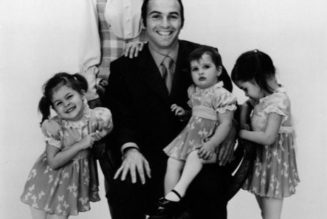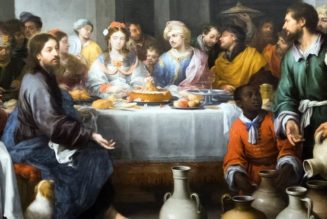
Jesus tells a story that’s deceptively simple on the 26th Sunday in Ordinary Time Year A.
The Parable of the Two Sons seems so slight and so obvious it almost isn’t worth talking about: A man tells his two sons to work in the vineyard. One says he’ll go but doesn’t; the other says No, then goes. Which did the father’s will? The one who went to the vineyard.
My natural reaction when I hear that is to shrug my shoulders and say, “Got it. Thanks.”
But then I remember two things that make me shiver and want to beg for mercy and grace.
The first thing I remember is what “Work in the vineyard” means, and then I remember how I spent my week.
The vineyard is the Church, and our work is, first, to love God by following Christ’s command to make disciples and teach his commandments and, second, to love our neighbor through the works of mercy, because, “Truly, I say to you, as you did it to one of the least of these my brethren, you did it to me.”
But how I spent my week was in loving myself above all else, exaggerating my own importance and looking for ways to get people to serve me, not vice versa.
If last Sunday’s message was, “There is no special status among vineyard workers”; this Sunday’s message is, “There is no special status among vineyard shirkers.”
So, let’s do a deeper dive into this, starting with the first son.
Why did the first son say No?
We can assume this man’s son said No for the reason our children do: They either think they know a better way to spend their time, or simply don’t want to be told what to do. Those who say No to the Church probably have the same reasoning. They don’t need God. Putting him in their lives gives them nothing but more emotional baggage, rules and headaches. With or without him, they figure, they still have to get what they need on their own: They have to earn money, find love, and secure their future.
Above all, they say No because they don’t trust God. The religious lives they have seen are unattractive and unconvincing, which suggests that maybe God is not really a force for good. So they say, “No way. I’m good with what I have. The Church is the last thing I need.”
And why did the second son say Yes?
Says Jesus: “The man came to the other son and gave the same order. He said in reply, ‘Yes, sir,’ but did not go.”
That “sir” is a key. That is where many of us are. If God wants something, we don’t just say Yes, we say Yes, sir! It’s called “fear of God” — we know God deserves our respect and awe. So we show up at church, and we say Amen when we’re supposed to say Amen.
But the real test comes after the Amen. How do we spend our week? Do we share his commandments? Do they guide our workplace discussions? Do we find the most effective ways to share his social teaching at work, his marriage teaching in our advice to friends, and to follow his moral teachings in our entertainment habits?
And what works of mercy do we do? Do we shelter the homeless, bear wrongs patiently, give food and drink to those in need, and admonish sinners? Do we instruct the ignorant, counsel the doubtful and comfort the afflicted? Daily?
Many of us, if we are honest, will have to say No to many of those questions — or worse.
Instead of working in the vineyard, we tend to want to police the vineyard. We criticize liberals or conservatives (or both!) and congratulate ourselves as if by critiquing others we had done something wise and bold. We criticize Pope Francis for being ambiguous, our bishops for being spineless, and our pastors for being superficial, and we have lots of evidence that we’re right. When we’re done, we feel satisfied.
What we forget is that God didn’t ask us for a critique, accurate or not; he asked us for work.
When we die and face him, he won’t applaud how observant and cutting our take on the synod was. He’ll look at what we did for others. Did we attract people to Christ? Or did our critical attitude tend to drive people away instead? Did we serve people in need — or did we spend our energies obsessing about world politics and Church problems while the needy waited outside (and inside!) our doors, getting nothing from us?
God says to us: Stop saying “Yes, sir” and please just do something! My people need you.
Or, in Jesus words: “Amen, I say to you, tax collectors and prostitutes are entering the kingdom of God before you. When John came … you did not believe him; but tax collectors and prostitutes did. Yet even when you saw that, you did not change your minds and believe him.”
To us, he might say: Welfare moms and alcoholics, drifters and post-abortive women, are entering the kingdom of God before you. And you met them but still didn’t change. You met the welfare mom with her dead child’s footprints tattooed on her arm and you didn’t share Christian hope. You met the alcoholic who knows exactly how long it has been since his last drink, and didn’t learn from his struggle. You met the drifter with his mom in the doctor’s waiting room, and chose a seat far away. You met the post-abortive single woman who struggles to make ends meet and cries whenever she sees small children playing, but you didn’t even notice her.
And while our Yes, sir! does mean we have “fear of God,” as one early Christian commentator put it, “At the beginning of the commandments of the law, he did not say, ‘You shall fear the Lord with all your heart’ but ‘You shall love the Lord with all you heart.’”
St. John Chrysostom said, “You should have repented long before they did. But you did not do it. So you are deprived of all excuses. … He came to you and you did not receive him. He did not come to them and they received him! And you did not even learn from their example.”
What will happen to us if we say Yes and do nothing?
Nothing good. “When someone virtuous turns away from virtue to commit iniquity, and dies, it is because of the iniquity he committed that he must die,” says Ezekiel in the first reading. “But if he turns from the wickedness he has committed, and does what is right and just, he shall preserve his life.”
What does he mean, we will “die”? Exactly what St. John Henry Newman means: “Go before God’s judgment-seat, and there plead that you know the Truth and have not done it. … How will it there be taken? ‘Out of thine own mouth will I judge thee,’ says our Judge Himself, and who shall reverse His judgment?”
So, where does that leave us? We failed. We haven’t done what we could. What now?
St. Paul describes what to do.
“If there is any encouragement in Christ, any solace in love, any participation in the Spirit, any compassion and mercy, complete my joy by being of the same mind, with the same love, united in heart, thinking one thing,” he says. “Humbly regard others as more important than yourselves, each looking out not for his own interests, but also for those of others.”
We know just how to do this, because Jesus did it. “He emptied himself, taking the form of a slave,” writes St. Paul, “becoming obedient to the point of death, even death on a cross.”
Humility and obedience is the only way — even for the Second Person of the Trinity.
As for you and me, we will face one test only when we die: Was I humble enough to put God first? And was I obedient? Did I make new disciples and serve those in need, like he said?
Whether you had the best take, worst take, or no take on the synod, or whether your pastor, pope and bishop were inspiring or disappointing, God will say one thing to you when you die: “I told you to love. Did you love?”
Your actions, not your words, will be your only answer.
Image: Pxhere.









